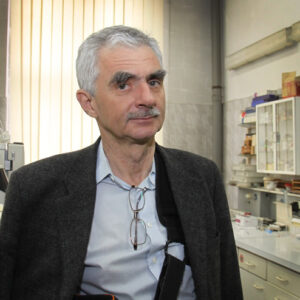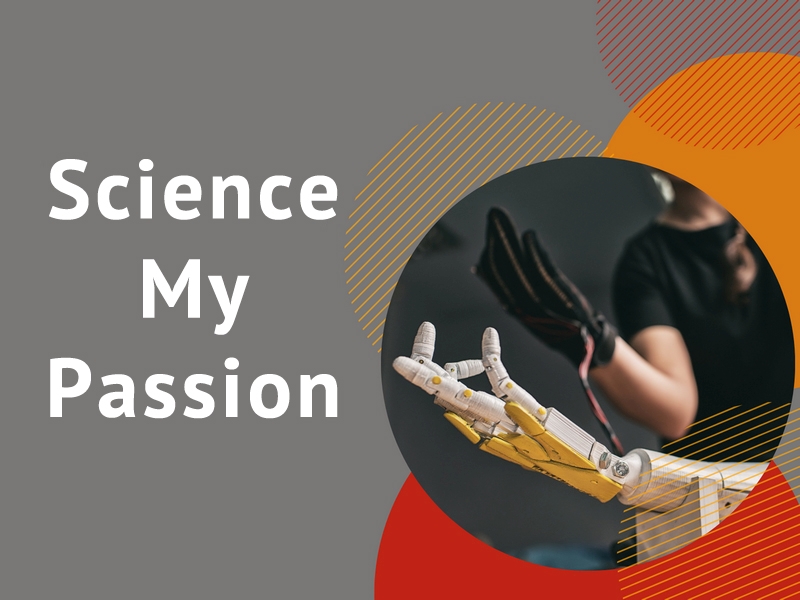SCIENCE | MY PASSION
According to the definition taken from the Polish Language Dictionary, science is complete human knowledge arranged into a system of problems, but also a set of ideas that constitute a systematic whole and comprise a specific research field.
Science is also activity: learning and teaching.
Please read the “Science | My Passion” series, where our researchers present their work and show that science and research process can really draw us in.
Prof. Eng. JAROSŁAW POLAŃSKI
Institute of Chemistry

photo: M. Kłoskowicz | UŚ archive
I choose chemistry
Science is curiosity. When seeing a tree, a physicist will ask how much it weighs, a chemist will ask if it can be converted into biofuel. The biologist will be interested in the shape of the crown and leaves in the context of the genome. The humanist will be interested whether it is not a linden tree under which Kochanowski was sitting. Nature jealously keeps its secrets. The answers to these questions are not simple. Hypothesizing is a fun and always risky game. The chemist may hypothesize that ethanol can be obtained from wood cellulose. Finally, we test the hypothesis in the laboratory, either confirming it or falsifying it. This is a somewhat simplified picture painted by the philosophy of science. It turns out that many of the discoveries in science are completely random or based on entirely wrong assumptions. However we look at the problem, there would be no science if it was not for the curiosity of the world.
Chemistry is often referred to as central science. Everything around is chemistry. The wooden chair on which I am sitting has a cellulose structure with a repeating motif of glucose monomer. The computer, the keys of which I hit, with the heart of silicon chips, and the emotions poured onto the paper are awakened under the influence of molecules flirting with each other, without which man cannot exist. They decide about addictions, emotions and procreative cycles.
Chemistry appears to be a complex science. Chemists managed to obtain about 300 million chemical compounds. Is that a lot? Not at all. That number pales when you compare it to 8 billion people worldwide. It is easy to understand that describing their interactions in terms of economics, for example, is a much more complex issue. It is economics that determines whether my work can be carried out in a laboratory. Will there be anything to describe. We cannot prevent crises, we cannot control the economy, we have problems to feed and water the world of almost eight billion. Bringing a new drug to market is a task comparable to settling a man on the moon, a chemical and pharmacoeconomic problem of unprecedented complexity. Pharmaceutical companies, big farms, they are giants, sharks of modern civilisation. We complain and envy their income. However, it must be remembered that sharks are essential in the ecosystem. We have to love them. Without them, there would be no drugs.
Where does my curiosity come from? I hypothesize that it was epigenetically conditioned. There was something in my genes that determined my interests deterministically. I took a lot from my childhood home, perhaps epigenetically recording it. I’m joking of course. After the war, my parents came from Lviv to Poland in today’s geographic shape. I lived in Brzeg, Tarnów, Kraków, Poznań, finally in Katowice, and briefly also in Gliwice, where I studied at the Faculty of Chemistry of the Silesian University of Technology. I attended four primary schools and two high schools. One of the schools made a great impression on me. This is the Pieck High School in Katowice, where I accidentally entered an experimental mathematics and physics class, because here in one of the few places in Katowice it was possible to teach German, which I had previously studied in Poznań. We were taught mathematics by professor Teodor Paliczka. He was like Alcybiades straight out of Niziurski’s novel. I learned not only math here, but also what full of fun Alcybiades drift didactics can look like. Remember, more fun, says the American Teacher Tip. Don’t be boring. This school was the first major challenge for me. School mathematics turned out to be more extensive than the one taught later in college. It was also enough for my scientific activity on the edge of chemistry and mathematics. Our class was full of exotic personalities. Here I met, for example, Rysiek Rudnicki, an outstanding mathematician, a professor of our Faculty for some time, and now a professor at the Institute of Mathematics of the Polish Academy of Sciences.
My curiosity was fueled by books. My parents’ apartments looked more like a library than a place in a gray block of flats. Debitless books tempted with political incorrectness. Paris Culture, Tyrmand, Wierzyński, Kołakowski. I started reading. I was fascinated by fiction, Balzak, Tomasz Mann or American writers, psychology and philosophy. Everything aroused my curiosity. Somewhere I came across popular science books about the structure of matter. From there it is close to chemistry. I could not forget my home experiments in which I electrolytically generated an odour of exceptional foulness. It is interesting that such exoticism did not discourage me from chemistry.
My father was a linguist, he lectured at the University of Silesia in Katowice, the Jagiellonian University in Kraków, the Adam Mickiewicz University in Poznań, and often also at Yale in New Haven, USA. The house has always been full of people of science “from the country and the world”. They were like colourful birds against the grey background of the People’s Republic of Poland. For several years we lived in a dormitory, an ecosystem close to science. The first time I was in Krakow’s Żaczek (student house) was in kindergarten. To this day I remember someone sleeping in the storage space. For a long time I could not understand why no one could sleep in our home storage space. Maybe it was the first time I thought that science was an interesting and fascinating prospect. Mission, a buzzword, has long been written in chemistry. It feeds, heals, dresses, builds. For me, this dimension of the usefulness of chemistry has always been important.
The habit of living in motion and changes dominated my professional experience, filled with new and new areas that I could not resist. I started with the chemistry of silicates, researching the devitrification of insulating glass and basalt fibres, first as a student at the Silesian University of Technology and then in the R&D centre in Katowice and later in Poznań. I have been working at the University of Silesia since 1985. Successively I dealt with organic chemistry, chemoinformatics, neural networks, design and synthesis of drugs – HIV integrase inhibitors and anti-cancer iron chelators. Recently, I have been paying a lot of attention to nanotechnology, catalysis and energy storage. Everywhere there I found attractive problems. Science is also a lot of fascinating people I met, with whom I spent a lot of time in Katowice, but also in Munich and Erlangen in Germany, Paris and Nice in France, or during a short stay at Stanford University in the USA. I got to know, understand and like their way of being and culture.
The university is also teaching. Contact with students and PhD students, to whom I try to pass on my fascination with science, gives a lot of pleasure. They are the ones who continue their research. I am still fascinated by books, now almost exclusively popular science. Harari telling the story of human evolution and the fictions he creates that allow us to survive, the optimistic Pinker, or Kahneman looking for traps of thinking. My fascinations are also my wife, children and grandchildren, with whom I have a great time. I like sports, I was skiing, I was running, now I swim more, cycle and walk. This is how I chose chemistry on the run.
Thank you for reading this entire post






